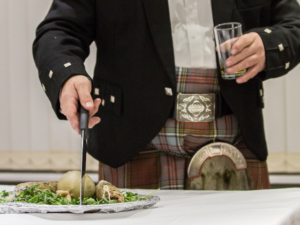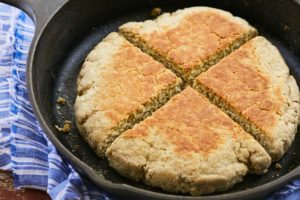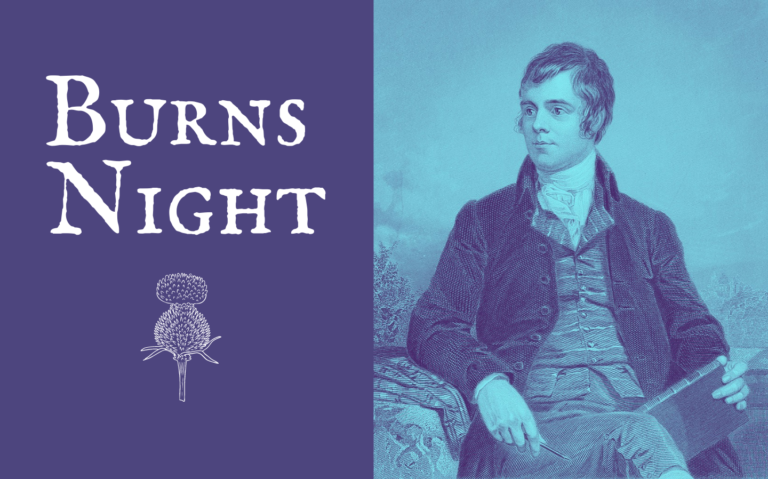Whether or not we have recent family connections to Scotland, we Scottish Americans are very much enthralled with Scottish traditions. This is especially true when it comes to Burns Night, the celebration of the birth of Scotland’s national bard, Robert Burns. The accepted history of the Burns Night celebration is that a group of his friends got together on the fifth anniversary of his death in July 1801 to mark his passing. They enjoyed their time together so much (lots of tasty haggis, speeches, toasts, poetry and plenty of whisky!) that the friends decided to get back together again, but on the anniversary of his birthday, thus our January 25 celebration.
The traditional approach

I’ve only been to a few formal Burns Night Suppers, but they all followed a similar format: big emphasis on piping in the haggis followed by a recitation of Burns’ “Address to a Haggis,” and perhaps a brief toast to his “immortal memory.” But usually little emphasis on the poet’s full wealth of works. As I plan my own celebration, the first with guests, I’ve been thinking about how to do it differently – how to connect to my heritage as a Scottish American as well as learn more about Burns’ poetry.
What did our ancestors know of Burns?
My Scottish and Scots-Irish ancestors who would have been Robert Burns’ contemporaries in the late 18th century were probably too busy colonizing what was then the western frontier of colonial America (western North Carolina and east Tennessee) to have known much about Burns. But history tells us that as early as 1788 pirated versions of Burns’ “Poems, Chiefly in the Scottish Dialect (Edinburgh Edition)” were making an appearance in the newly independent United States and gaining fans.
Burns loved the American patriots
Burn’s popularity in the early United States can be partially attributed to his passion for the general ideals of liberty and freedom, which are found throughout his poetry. Some historians have made the case for Burns as radical, pointing to poems and songs written late in his career until his death in 1796.
Two of those later works were pieces praising the American Revolutionary War. While neither is particularly well known today, they make clear his admiration for the American patriots as can be read in these lines from “Ode for General Washington’s Birthday”:
But come, you sons of Liberty,
Columbia’s* offspring, brave and free,
In danger’s hour still flaming in the van,
You know, and dare maintain, The Royalty of Man!
Robert Burns
*Columbia is a historical name for the Americas that was in popular use during the early to mid 18th century.
His other work dedicated to the Americans was a song, “Ballad on the American War,” which chronicled key events during the revolution such the Boston Tea Party, the colonists’ invasion of Canada, the siege of Boston, the occupation of Philadelphia and New York, the battle of Saratoga, the southern campaigns and the squabble between two British commanders resulting in their defeat at Yorktown.
The poet’s U.S. influence today
Whether or not Scottish Americans know of Robert Burns’ support for the beginnings of our country, his poetry has influenced our culture and our language – even though we may not always know that he is the source. We lament “the best laid plans of mice and men”; we wish we could “see ourselves as others see us”; we declare “our love is like a red, red rose” and at the beginning of every year we sing the question “should auld acquaintance be forgot?”
What is the Scottish American way to celebrate?
As we prepare to honor Rabbie Burns next week, I propose we put a little more of our American selves into our celebrations of the Scottish bard. I think Burns would expect it because he apparently liked our rebellious American nature!
For my part, I’ve asked all my Burns Night guests (most are newbies to Burns) to be prepared to recite a favorite or new-to-them Burns poem – memorization not required; Scots dialect optional. Rather than serve the traditional menu: a starter of Scotch broth or cullen skink, entree of haggis with neeps and tatties followed by clootie dumpling or cranachan for dessert, I’m mixing things up a bit.
Introduce some colonial influences

My starter will be haggis bon bons (recipe courtesy of a Scottish Australian), an entree of smoked trout chowder – a nod to cullen skink but with a more readily available local fish, accompanied by fresh greens from a friend’s farm and Scottish bannock. Bannock is a quick bread made from flour and oats that can be cooked on a hot stone, griddle or in my case, a cast iron skillet. Typically, the quick bread that I make is cornbread, which my Scots-Irish ancestors learned from the indigenous people they were colonizing in the Southern Appalachian Mountains. I’m going to try the bannock as an experiment – maybe using bacon grease in place of oil as a nod to my colonial ancestors. And finally my dessert will be a slow-cooker version of sticky toffee pudding cake topped with whipped cream. I’ve made both clootie dumpling (a pudding cake boiled in a cloot or cloth) and cranachan (a raspberry, cream and whisky-soaked oats combination); they are good, but sticky toffee pudding is a favorite so it goes on the menu!
Of course, uisge baugh, the water of life, or whisky as most of us know it, will figure prominently as well. Burns was known to enjoy his libations, and I’m sure he’d appreciate the ingenuity of the early Scottish and Scots-Irish immigrants who took their knowledge of distilling barley for Scottish whisky or Scotch and used it to make American whiskey (note the “e”) with the more readily available corn and rye they learned to cultivate from the indigenous people in the colonies. We’ll have a wee dram of both!
How about you?
What are you doing this year for Burns Night, and what are your ideas for making it more Scottish American or Scots-Irish? Share in the comments below or on the Scottish-American Facebook page.


